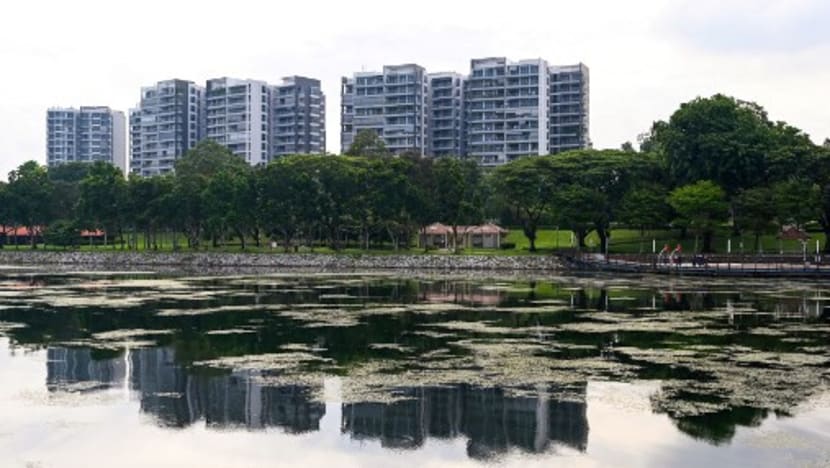New cooling measures a pre-emptive move to dampen investment demand for residential properties: Desmond Lee
Interest from both local and foreign investors in the residential property market is starting to come back, says National Development Minister Desmond Lee.

A row of condominium blocks near Lower Seletar Reservoir in Singapore on May 6, 2021. (File photo: AFP/Roslan Rahman)
SINGAPORE: The increases in the additional buyer’s stamp duty (ABSD) are a “pre-emptive measure” to dampen local and foreign investment demand amid renewed interest in residential properties, said Minister for National Development Desmond Lee on Thursday (Apr 27).
“We have made these measures for those two reasons – prioritise Singaporeans who are buying for owner occupation, but also pre-emptively dampening demand by investors, both local and foreign, for residential property,” he told reporters.
Foreigners buying any residential property in Singapore from Thursday will have to pay an ABSD of 60 per cent – doubled from 30 per cent. This was the steepest increase among the cooling measures announced by the government late Wednesday night.
Singaporeans buying their second residential property will pay an ABSD rate of 20 per cent, up from 17 per cent, while those buying their third and subsequent residential property will have to pay an increased rate of 30 per cent, up from 25 per cent.
The rate of 30 per cent also applies to permanent residents buying their second residential property. PRs buying their third and subsequent residential property will pay an ABSD of 35 per cent, up from 30 per cent.
According to flash estimates released by the Urban Redevelopment Authority earlier this month, private home prices rose 3.2 per cent in the first quarter of 2023. This is up from the 0.4 per cent increase in the preceding quarter.
Based on 2022 data, the new measures will impact about 10 per cent of all transactions, said Mr Lee.
This is the third round of cooling measures since December 2021.
The last two rounds of property cooling measures, alongside the uncertain global economic environment and high mortgage interest rates have had some moderating effects on Singapore’s property market, said Mr Lee.
“We’ve started to see some early signs of price moderation,” he added.
“Having said that, our property market in Singapore continues to be resilient despite all of this moderation settling in.”
This is driven by two things – a strong demand from Singaporeans to buy homes to live in, and renewed local and foreign interest in investing in residential properties, said the minister.
The former is partly a result of construction delays brought about by the COVID-19 pandemic, and more nuclear families or individuals moving out on their own, he added.
Interest from both local and foreign investors is “starting to come back” into the residential market, said Mr Lee.
For example, foreign investments, as a proportion of property transactions, fell from about 20 per cent in 2011 to about 3 to 4 per cent in the last few years, he added. The average from 2017 to 2019 was about 6 per cent.
Cooling measures, the economic environment and COVID-19 border closures affected this proportion, said the minister.
But in the first quarter of this year, foreign interest returned to the market – foreign purchases of residential property made up about 7 per cent of all transactions, he said.
“Foreign interest in residential property in Singapore as an asset class continues to be strong,” he added.
“And therefore if we don’t take early pre-emptive measures, we may see investment numbers both by locals and by foreigners grow, and that will add stress to Singaporeans who are looking to buy residential property principally for owner occupation.”
Data has shown that locals are "very price sensitive" to ABSD moves, said Mr Lee in response to a question about the differing increases for foreigners and that for Singaporeans and PRs.
The ABSD adjustments for Singaporeans and PRs “should suffice” to dampen local investment, he added.
“But when you talk about foreign investment demand, you’re talking about really … people who see Singapore residential property as an attractive investment class. Therefore, we've had to calibrate the ABSD rate in order to have an effective dampener on investments from abroad," said the minister.
When asked whether ABSD rates may drop in the future, Mr Lee noted that Singapore has taken measures on both the supply and demand sides to achieve stability and make sure the markets "don't run ahead of economic fundamentals".
Mr Lee added: "As to whether any of these measures can be unwound or relaxed or maybe even need to be tightened, I think that is something that we keep a very close eye on.
"And it really depends on the climate, and we have to study very carefully what are the key demand drivers or whether the demand drivers go up or down and then see what measures need to be taken."


















